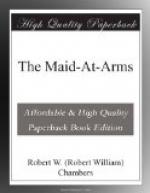Now, in the face of this dark, soothing truce that we call night, which is a buckler interposed between the arrows of two angry suns, I stood thinking of war and the wrong of it. And all around me in the darkness insects sang, and delicate, gauzy creatures chirked and throbbed and strummed in cadence, while the star’s light faintly silvered the still trees, and distant monotones of the forest made a sustained and steady rushing sound like the settling ebb of shallow seas. That to my conscience I stood committed, I could not doubt. I must draw sword, and draw it soon, too—not for Tory or rebel, not for King or Congress, not for my estates nor for my kin, but for the ancient liberties of Englishmen, which England menaced to destroy.
That meant time lost in a return to my own home; and yet—why? Here in this county of Tryon one might stand for liberty of thought and action as stanchly as at home. Here was a people with no tie or sympathy to weld them save that common love of liberty—a scattered handful of races, without leaders, without resources, menaced by three armies, menaced, by the five nations of the great confederacy—the Iroquois.
To return to the sea islands on the Halifax and fight for my own acres was useless if through New York the British armies entered to the heart of the rebellion, splitting the thirteen colonies with a flaming wedge.
At home I had no kin to defend; my elder brother had sailed to England, my superintendent, my overseers, my clerks were all Tory; my slaves would join the Minorcans or the blacks in Georgia, and I, single-handed, could not lift a finger to restrain them.
But here, in the dire need of Tryon County, I might be of use. Here was the very forefront of battle where, beyond the horizon, invasion, uncoiling hydra folds, already raised three horrid, threatening crests.
Ugh!—the butcher’s work that promised if the Iroquois were uncaged! It made me shudder, for I knew something of that kind of war, having seen a slight service against the Seminoles in my seventeenth year, and against the Chehaws and Tallassies a few months later. Also in November of 1775 I accompanied Governor Tonyn to Picolata, but when I learned that our mission was the shameful one of securing the Indians as British allies I resigned my captaincy in the Royal Rangers and returned to the Halifax to wait and watch events.
And now, thoughtful, sad, wondering a little how it all would end, I paced to and fro across the porch. The steady patter of the dew was like the long roll beating—low, incessant, imperious—and my heart leaped responsive to the summons, till I found myself standing rigid, staring into the darkness with fevered eyes.
The smothered, double drumming of a guitar from the distant revel assailed my ears, and a fresh, sweet voice, singing:




